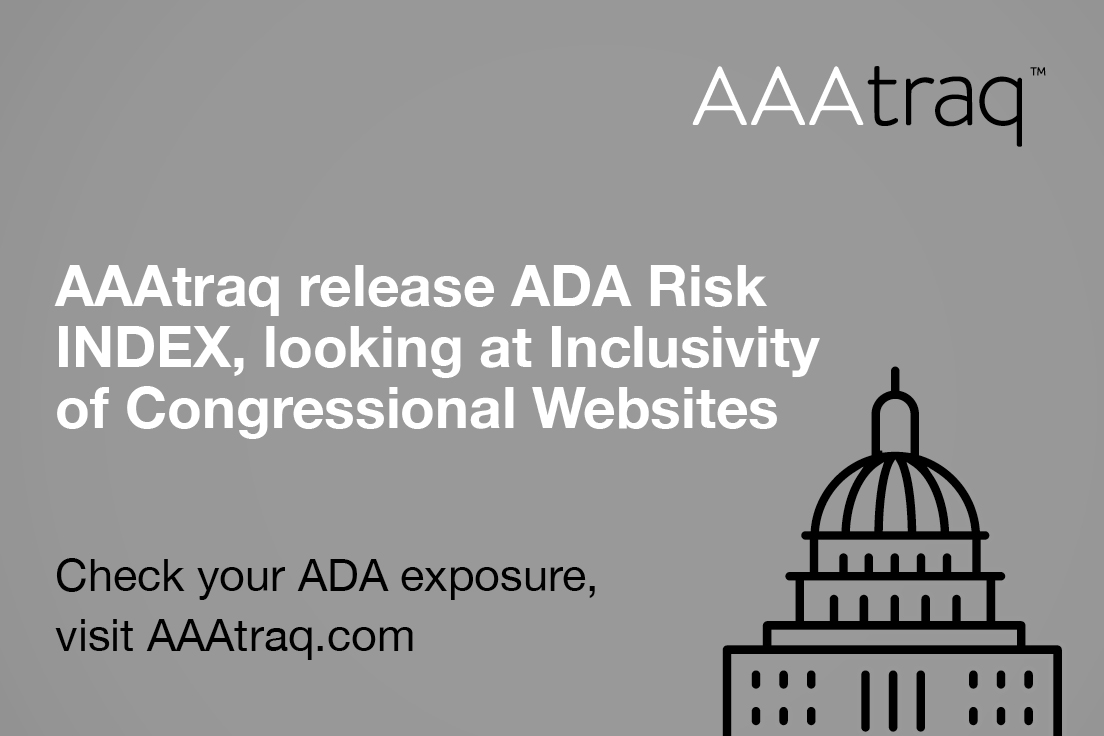Congress ADA Risk INDEX | How Inclusive Are Congressional Websites?
Aug 04 2022
[AUGUST 4, 2022 NEW YORK] The latest report by InsurTech company, AAAtraq (AAAtraq.com (opens in a new window)) on the Inclusivity of more than 600 Congressional websites shows that the majority of Congressional webpages are inaccessible to disabled users and that more than 9 out of 10 pages are vulnerable to litigation.
While much has changed about the nation in the last three decades, the fact that the government isn’t doing enough to protect disabled citizens has not. Congress consistently fails to protect disabled Americans in both providing constituents with accessible content and by failing to enact meaningful legislative amendments to the ADA that expressly deal with web content.
With 537 Congressional Member websites scored, only 4.29% demonstrated digital inclusivity. 393 members’ websites fell into the higher risk categories, and 55 members had a score above 100. For the first time since running the Congressional Inclusivity Report, one member of the United States 117th Congress had a score of 0. Member scores are run monthly, and their changes are logged and tracked to demonstrate trends in their progress.
Of those members scored, statistically significant trends were found. While the average score for the House was 45.25, the Senate scored significantly higher at 71.16. In the House, Republicans (42.57) had a lower score on average than Democrats (47.82). In the Senate, Democrats (64.40) had a lower score on average than Republicans (78.94), with Independents (39) scored lower on average than both major parties.
Modern society is ever-more dependent on websites. In recent years, accelerated by the COVID-19 pandemic, there has been increased reliance on digital services in government. In this high-profile sector, organizations must start dealing with compliance to the law, such as the Americans with Disabilities Act of 1990 (ADA), to set a positive, non-discriminatory example, whilst avoiding distracting litigation.
The ADA was enacted in 1990, with the intention of eliminating disability-based discrimination. Since its passage, billions of dollars have been spent to make public spaces more accessible to individuals with disabilities. As time passed, the integration of accessibility features into society embedded themselves into the everyday life, with many overlooking just how important such features are to people with disabilities - you wouldn’t expect to find a building without a wheelchair ramp. The law doesn’t just stop at physical spaces. It extends to digital spaces, and websites must adhere to regulations and accommodate people living with disabilities.
In terms of the ADA’s application to websites, a false sense of security within many organizations, leaving owner’s to believe that they have matters in hand. However, as this report demonstrates, the percentage of congressional websites found to be vulnerable, and at risk, exceeds 90%. With this false sense of security, it is no wonder that litigation is growing exponentially.
Part of the problem is the rapid growth of digital; organizations haven’t recognized that their website is a key asset that should be risk-assessed and managed in the same way as any other important asset. Unless organizations appreciate this potential exposure and start to understand the regulatory and societal importance of non-discrimination, opportunist lawyers will continue to ride what has become a very lucrative 'gravy train'.
Government organizations need reporting that they can immediately understand, and resolutions should not be left entirely with the technical team. An organization-wide, 'holistic' approach, is required, adhering to basic risk management principles.
The report is now available, for more details, please contact abialek@AAAtraq.com
The findings of the report will highlight the level of compliance that Congress is currently achieving and how exposed organizations are to the risk of litigation.
Subscribe to AAAtraq and enjoy complete cover and peace of mind
